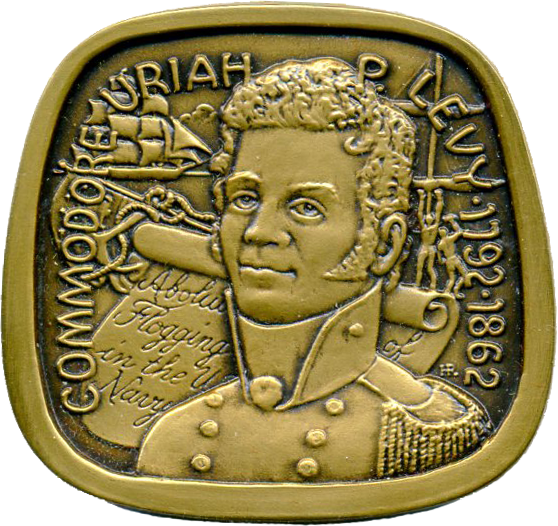 |  |
Uriah P. Levy medal designed by Hal Reed, struck by Medallic Art Company in quantities of
350 bronze, 118 pure silver and 25 10kt gold. Obverse: Portrait, sailing ship, flogging scene and
anti-flogging petition, COMMODORE URIAH P. LEVY • 1792 • 1862, HR monogram.
Reverse: Monticello, Th Jefferson (signature). 47 x 45 mm.
Forty years before French army officer Alfred Dreyfus was court-martialed, convicted and eventually exonerated in trials based on anti-Semitism, an American naval officer was facing similar tribulations. The American court’s verdict was unanimous for the 63 year old defendant: “Uriah P. Levy is morally, mentally, physically and professionally fit for the Naval Service and ought to be restored to the active list of the Navy.” Within five years of this court-martial, Levy was placed in command of the entire Mediterranean Fleet and was elevated to the Navy’s highest rank — Commodore.
Uriah Phillips Levy was born in 1792 in Philadelphia. He was barely 14 years old when he embarked on his naval career by signing on as a cabin boy. Seven years later he volunteered for service in the United States Navy during the War of 1812, as “proof of love to my country.” The next year, Uriah was captured and imprisoned by the British until the end of the war. In the years following, he faced persecution from many naval officers, he had to defend himself in a duel, and was subjected to six courts-martial, all instigated by anti-Semitism.
Throughout his life, Uriah P. Levy, was active in religious life; he was the first president of the Washington Hebrew Congregation, and in 1854 he sponsored the new Seminary of the Bnai Jesherun Educational Institute in New York.
It was Levy’s wish that he be remembered for his singular efforts to abolish the barbarous punishment of flogging in the U.S. Navy, which resulted in Congressional approval of an anti-flogging bill in 1850.
Uriah P. Levy regarded Thomas Jefferson as “one of the greatest men in history, who did much to mold the Republic in a form in which man’s religion does not make him ineligible for political or governmental life.” Thus, about 10 years after the former President’s death in 1826, Levy purchased Jefferson’s rundown estate, that was virtually in ruin. He began a long and costly program of renovation and restoration, including the purchase of an additional 2,500 acres adjoining the historic property. After Levy’s death in 1862, his will directed that Monticello — the house and property — be left “to the people of the United States.”